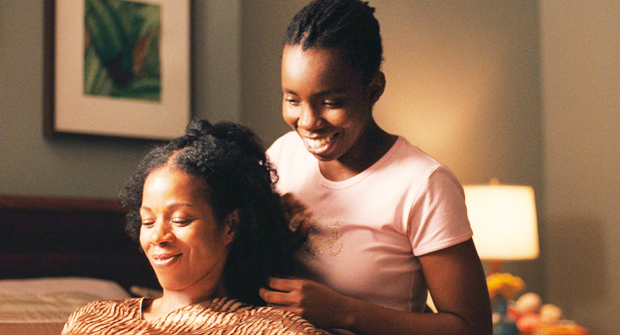Black, lesbian and troubled home life? New film ‘Pariah’ hits as a middle-class ‘Precious’

SHARE AND SHARE ALIKE | A closeted 17-year-old (Adepero Aduye, right) shares a moment with her clueless mom (Kim Wayans) in ‘Pariah.’
3 out of 5 stars
PARIAH
Adepero Aduye, Pernell Walker, Aasha Davis, Kim Wayans
Rated R. 85 mins. Now playing at Landmark’s Magnolia
…………………….
While politicians debate whether life begins at conception, dudes know it begins at puberty, when we start masturbating hourly until we can interact sexually with others.
An exception might be for gays, who begin life when we come out, becoming aware of who we are and finally knowing for sure what we want.
Pariah is a realistic portrait of a young woman who, at 17, knows who she is and what she wants but hasn’t quite figured out how to act on it. Things are complicated because she’s lesbian and has to worry about the reactions of peers and parents.
Alike (Adepero Aduye) doesn’t care about the kids at school, who have figured out from her butch demeanor that she’s not exactly a girly-girl, but her folks are something else entirely. Her father, Arthur (Charles Parnell), is a police detective with homophobic friends, but he’s clueless where Alike (ah-LEE-kay) is concerned. Her mother, Audrey (Kim Wayans), is a control freak who can’t wait for Alike to outgrow her “tomboy phase.”
On the positive side, Alike is lucky to have Laura (Pernell Walker) as a BFF, confidante and tour guide through the coming out process and the lesbian subculture. “You need to pop that damn cherry of yours,” Laura tells Alike, going so far as to buy her a strap-on (though perhaps not the most appropriate model).
Perceiving Laura as a bad influence on her daughter, Audrey tries to keep them apart. She forces Alike to spend time with Bina (Aasha Davis), the daughter of a church friend. But the plan backfires for better — and worse — than any of them could have expected, as Bina unintentionally drives a wedge between Alike and Laura.
Anyone who’s ever been a teenager can relate to the emotions involved when one changes besties, and it gets more complicated when sex is involved.
When Alike finally comes out at home the reactions are predictable. Audrey is too bourgeois to go all Mo’Nique on her ass, but the scene is at least semi-Precious.
Indeed, with its hard look and African-American setting, Pariah easily recalls Precious, though it’s more reined in in just about every way, so it doesn’t afford the opportunity for attention-getting histrionics that win awards.
This has been a long project for filmmaker Dee Rees, who wrote it as a feature several years ago, then made a short version in 2007 that played the festival circuit. The result is praiseworthy and I suspect Rees will feel rewarded when she sits in a theater and hears even straight girls cheering on Alike, as you’ll want to.
At any rate, life begins for Alike in the course of Pariah — and careers begin for Rees and Aduye as a result.
— Steve Warren
This article appeared in the Dallas Voice print edition January 6, 2012.













